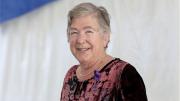
Obituary: Jill Paton Walsh
Jill Paton Walsh
9 April 1937 – 18 October 2020
Jon Appleton pays tribute to Jill Paton Walsh, who has died aged 83.
Rigorous is a word I associate with Jill Paton Walsh. It was a quality her father demanded of his daughter as he did his son – by no means the norm in 1937. This policy made her entirely rethink her Oxford university education, ditching English ‘because there are no right or wrong answers’ in favour of returning to the roots of the language and studying the Anglo-Saxons.
She was rigorous in her approach to her books – she was working on her fiftieth when she died on 18 October 2020 – ‘for The Emperor’s Winding Sheet I learned Byzantine Greek, so I could read the emperor’s secretary’s diaries written inside the city,’ she told me earlier this year when I visited her in Cambridge to talk about her life and work. Pursuing accuracy, she spoke to a neighbour who’d experienced the Normandy landings first-hand for The Dolphin Crossing. He’d never before articulated his experiences – that was when Jill committed herself to relying on people as often as books. She visited cotton mills, tin mines, factories – you name it.
Her first book was Hengest’s Tale, published in 1966. She wrote it out of boredom and frustration, having left teaching and being stuck at home with a baby. With Fireweed (1970), her income from writing exceeded her earning potential from teaching. She smiled: ‘But I hadn’t closed the door behind me, I just walked through a different door.’
Fondly remembering her former students, she wanted to explore their interests; the story of Grace Darling allowed Jill to write about the harsh side of celebrity, something her readers in 1991 had more awareness of than Grace in 1838.
In 1976, Unleaving, a companion novel to Goldengrove, won the Boston Globe/Horn Book prize. (Jill’s awards and commendations spanned the age range from a Whitbread Award for The Emperor’s Winding Sheet to the Smarties Prize for the middle-grade Gaffer Samson’s Luck to a Carnegie shortlisting for the early reader Thomas and the Tinners.)
‘From then on, I was very successful and very welcome in the United States. I began to teach an MA in children’s literature at Simmons College in Boston. After we were all dismissed by the Dean we set up our own organisation, Children’s Literature in New England.’
The ‘we’ Jill refers to includes John Rowe Townsend, who died in 2014. When they met in the 1960s, John was children’s books editor of the Guardian. He asked Jill to write for the paper and years later when his beloved wife Vera died he asked to meet again. He had, it seemed, found a way into his grief through Jill’s fiction.
‘He rang me up and said he wanted to talk to the person who had written Goldengrove. And so I got on a train and went to Manchester to talk to him.’
For two years they met and talked. ‘Then suddenly we discovered that we were in love with each other. We shared a narrowboat together, took our children on joint holidays, saw each other frequently – made no attempt at disguise.’
And they wrote, at adjacent desks, whenever they could. When her youngest child went to university, Jill left her marriage and went to live permanently with John. Theirs was a strong, significant literary partnership. They eventually married in 2004.
Jill and John were very different in practice and style but offered each other unlimited support. They would discuss works in progress and be each other’s first reader. If one of them was speaking somewhere, the other would do the driving. They established their own imprint, Green Bay Books.
Once they tried to collaborate, but only John’s name appeared Cloudy Bright (1984). ‘My input was that I know a lot about cameras.’ Jill laughed (she laughed a great deal, generously): ‘It was disastrously difficult!’
Jill’s rigour extended to raising standards within her profession. She chaired the children’s committee of the Society of Authors and would mobilise members – she organised a visit to a printer to understand why authors were being charged for making excessive corrections to page proofs with the transition from hot-metal to digital typesetting.
Today Jill is equally known as a writer for adults. Knowledge of Angels, shortlisted for the 1994 Booker Prize, made her a household name – partly for the story of its publication, told elsewhere, and her crime fiction, including Lord Peter Wimsey continuation novels.
As a writer for young people, she is remembered as one of the finest to emerge in the second half of the twentieth century. She told me:
‘Children’s literature matters much more than adult literature [because] children still have the main choices in life to make. If you get their attention with some moral dilemma or interesting question it comes in time for them to consider it before they plunge into life. The introduction of real literature when they are young is capable of influencing them.’
And she was emphatic to the end that this mattered most: ‘If I had a new idea for a children’s book I’d be overjoyed and I’d sweep the desk clear of the adult work.’




